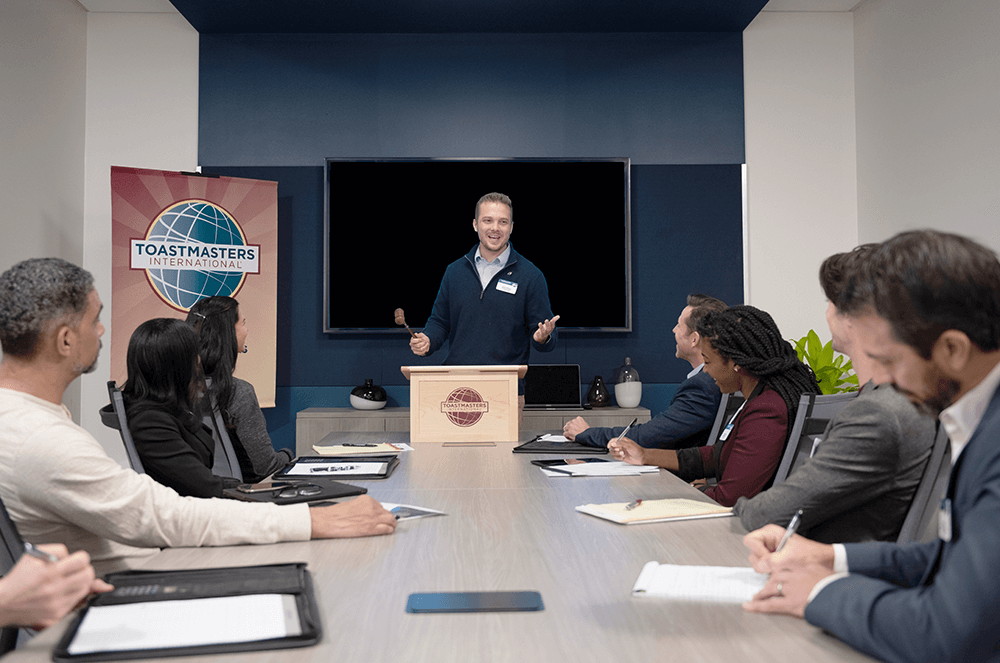
Every year, Toastmasters clubs elect their leaders. The most visible officer, the one with the highest profile, is the Club President.
The President sets the tone for the club. They build the relationships and establish the network that allow members to reach their individual goals and the club to reach its Distinguished Club Program goals.
The acronym TEAM sums up the role of the Club President.
T stands for training and resources.
Club officers are trained twice a year. While some of the training may seem repetitive, each session includes updated information club officers need from District leaders. Toastmasters International has many resources a Club President can use, including the Club Leadership Handbook, the Club Constitution for Clubs of Toastmasters International, and the Distinguished Club Program and Club Success Plan manual.
E stands for lead by example.
Mary Ann Davila, DTM, Area 34 Director and member of the Momentum Toastmasters in San Juan, Puerto Rico, encourages Club Presidents to work on their educational goals. “If you are asking members to work on Pathways,” she says, “then you should work on Pathways too.” Davila says that Presidents should share their vision with the club at the beginning as well as throughout the Toastmasters year.
Mark Reynolds, DTM, member of Limestone Coast and Devils Advocate clubs in Australia, agrees with Davila that the President must lead by example. “The President should not only communicate well but should look at the overall club to see that officers are communicating effectively with other officers and members,” he says. Reynolds also says that Club Presidents should routinely let members know they are appreciated.
A stands for ask questions.
Su Brooks, DTM, a member of Talk of Monmouth in Tinton Falls, New Jersey, says that Club Presidents need to listen to members to find out their needs. “This is crucial when creating a Club Success Plan,” she notes. Club Presidents can also ask questions of Area, Division, District, and international leaders. Brooks recommends building relationships with other Club Presidents. This is an excellent way to find answers to the challenges a club faces, she says.
M stands for meetings.
Reynolds says he encourages Club Presidents to meet with the Club Executive Committee at least once a month to ensure that each club officer is on the same page with club issues. The committee can also keep the President up to date on any challenges that require a diplomatic solution. Also, Club Presidents represent their club at Area, District, and international meetings.
What are the benefits of being a Club President? Brooks says that she felt she stretched her managerial skills. “I especially learned a lot about delegating tasks,” she says. Reynolds and Davila point out the joy of working with amazing teams and recognizing the success of club members.
“It is important to be humble,” says Reynolds. “Your term will end quickly.”
Go Team!
The Club President is the ultimate team player. In this role, your efforts are in service of others’ goals. You can make your club stronger, inspire your club members with your encouragement and support, and empower them to learn and improve.
As the Toastmasters Club Leadership Handbook states, “Leaders achieve results for their clubs by giving priority attention to the needs of their members and fellow club officers. Consider yourself a steward of your club’s resources—human, financial, and physical.”
When your club holds its next officer elections, why not volunteer yourself for the role of President? If selected, you’ll learn a great deal about leadership in your journey.
Editor’s Note: This is the first in a series of recurring articles covering club officer roles.
Peggy Beach, DTM is a freelance writer and communications instructor in Raleigh, North Carolina. She is a Past District 37 Governor. A member of the Hi Rise Toastmasters in Raleigh and the Top Triangle Toastmasters in Morrisville, she is available at writereditorpeggybeach@gmail.com.



 Previous
Previous

 Resources to Help
Resources to Help
 Previous Article
Previous Article